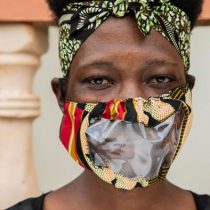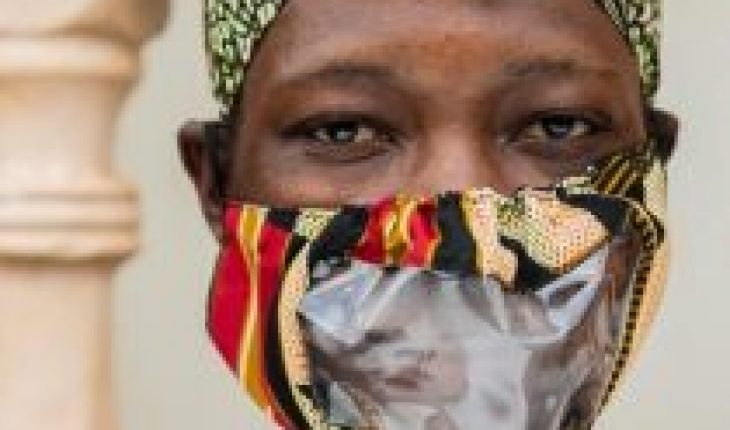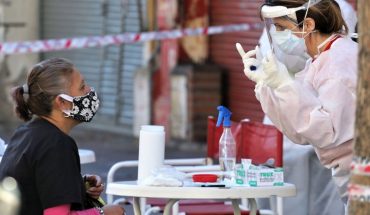
When Juliet Namujju was five, her parents had a car accident. His mother died and his father lost both legs. Since then, Juliet has lived with her grandmother, who was a dressmaker. Time and time again he experienced the difficulties his father faced, and how much people with disabilities are discriminated against.
“People’s perception of my father because of her disability led me to fight her,” Namujju recalls. It was proposed as a mission to “change people’s mindset toward people with disabilities.”
Fashion design may not seem like an obvious path to social change. However, the 24-year-old entrepreneur is using her bold clothing designs not only to help people with disabilities, but also to address the problem of waste disposal in Uganda.
An early start
Namujju began to be creative as a child, making toys with the remnants of her grandmother’s sewing table.
“I would go quickly and pick them up, put them together with plastic waste, bottles and other polyethylenes, and sew them into small balls and dolls to play with,” Namujju says.
Juliet Namujju uses fashion to address discrimination against people with disabilities, as well as the waste problem in Uganda.
Today, Namujju uses these skills for other purposes.
Three years ago, at just 21 years old, Namujju launched Kimuli Fashionability. A sustainable fashion brand based in the city of Mpigi, central Uganda, which employs people with disabilities to recycle plastic and other waste, and turn them into clothes, accessories and, more recently, eye-catching masks. But not just any kind of mask.
When confinement in Uganda ended in May and Namujju returned to the workshop with his team, he realized that the hearing impaired, about half of his 25 workers, had one problem: the protective masks they used to prevent the spread of COVID-19 prevented them from reading lips.
Inclusion masks
“We sat down with some of the hearing impaired and wondered, how can we make our mask different from the others, a mask that benefits people who can’t hear or talk?”
Namujju and his team developed a design with a transparent screen made of treated plastic waste, which fits into a cloth mask, usually cotton, and is topped with an elastic band and filter.
Most Kimuli Fashionability employees are people with disabilities, half of them hearing impaired, including dressmakers Agnes Nabagala (second from left) and Debroah Nakabira (third from left).
The viewing window is often tarnished, according to Rose Nakangu, who has hearing problems and works for Kimuli Fashionability in the manufacture of masks. Still, it admits it’s a big improvement over the standard mask. And he adds that Kimuli masks are comfortable to wear, and breathing is easy.
Since June, Kimuli Fashionability has sold more than 2,000 of these lip-reading masks, including an order of 600 from Diversability, a Los Angeles-based organization that supports the work of people with disabilities.
The team is very motivated to maintain demand. “I want to work hard so that we can make more of these transparent masks and distribute them to children with hearing impairments,” says Agnes Nabagala, a single mother with hearing problems who has been working as a seamstress at Kimuli Fashionability for three years.
A different look at plastic waste
Garbage is a big problem in Uganda. Much of it, including huge amounts of plastic, is not properly thrown away and piled up on the streets of cities like Mpigi.
Zaharah Nabirye washes the garbage bags to be recycled into accessories.
The hearing-having seamstress, Rose Nakangu, making one of Kimuli Fashionability’s masks to read lips.
Some of this waste now arrives at Kimuli Fashionability through the Academy of Social Innovation in Mpigi, a social business center that pays local women to collect waste throughout the community. The fashion brand then cleans and processes the trash.
“When I look at the residue, I see something beautiful, like a flower,” Naamujju says, explaining the name of his brand. Kimuli means flower in the local language of Luganda.
But not everyone shares this point of view. Foreigners like to buy their designs, Namujju reports. But he says it’s hard to convince Ugandans that discarded items can lead to desirable fashion.
“For many, it’s still a waste,” he laments.
Recycling instead of waste
In 2019, Kimuli Fashionability organized a fashion show in Mpigi to try to change the image of clothing made from recycled materials and attract local customers. The young company hopes to repeat the event this year, albeit this time virtually.
Namujju is convinced that garments made from waste could reduce the problem of litter in her country if enough people were willing to wear that fashion.
“People on the outside wear these jackets. But why not the Ugandans? It makes us very sad,” Namujju says. “We want 90 percent of Ugandans to wear these jackets, these masks, because I think it will also help us reduce the problem of plastic waste in Uganda,” he concludes.





